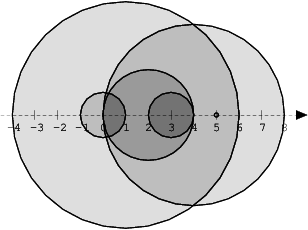[Codility] Sorting - NumberOfDiscIntersections 풀이
예문
https://app.codility.com/programmers/lessons/6-sorting/number_of_disc_intersections/
We draw N discs on a plane. The discs are numbered from 0 to N − 1. An array A of N non-negative integers, specifying the radiuses of the discs, is given. The J-th disc is drawn with its center at (J, 0) and radius A[J].
We say that the J-th disc and K-th disc intersect if J ≠ K and the J-th and K-th discs have at least one common point (assuming that the discs contain their borders).
The figure below shows discs drawn for N = 6 and A as follows:
A[0] = 1
A[1] = 5
A[2] = 2
A[3] = 1
A[4] = 4
A[5] = 0

There are eleven (unordered) pairs of discs that intersect, namely:
discs 1 and 4 intersect, and both intersect with all the other discs; disc 2 also intersects with discs 0 and 3. Write a function:
class Solution { public int solution(int[] A); }
that, given an array A describing N discs as explained above, returns the number of (unordered) pairs of intersecting discs. The function should return −1 if the number of intersecting pairs exceeds 10,000,000.
Given array A shown above, the function should return 11, as explained above.
Write an efficient algorithm for the following assumptions:
N is an integer within the range [0..100,000];
each element of array A is an integer within the range [0..2,147,483,647].
해석
- N개의 disc가 있다.
- disc : 0 ~ N -1 까지 번호를 가짐
- A : N 개의 양수들로 구성 된 배열
- A[N] : 디스크의 반경
- J번째 디스크의 중심 : (J,0)과 반경 A[J]로 그려짐
- J번째랑 K번째 디스크가 J ≠ K 이면 교차하고 적어도 하나의 공통점을 가진다.
- 배열A개 주어졌을 때 교차하는 디스크의 수를 반환하라!
- 교차 쌍이 10,000,000을 초과하면 함수는 -1을 반환
풀이
- 교차하거나 원을 포함하는 디스크의 개수를 구해야 함.
- 해당 위치에 도달하는 디스크들의 수
- 현재 J 기준으로 반지름을 구해서 lower, upper 배열에 담는다.
- lower 배열 : J - A[J]
- upper 배열: J + A[J]
- 각 배열을 정렬한다.
- upper 보다 작은 lower 들은 반드시 가장 작은 upper 보다 큰 반지름을 갖는다. = 접점
- 다음 upper 에서 겹치지 않게 현재 J 만큼 빼준다.
제약사항
- N의 범위는 정수 [0..100,000]
- 배열A의 각 요소의 범위는 정수 [0..2,147,483,647]
코드
import java.util.Arrays;
public int solution(int[] A) {
int N = A.length;
long[] lower = new long[N];
long[] upper = new long[N];
for (int i = 0; i < N; i++) {
lower[i] = i - (long) A[i];
upper[i] = i + (long) A[i];
}
Arrays.sort(lower);
Arrays.sort(upper);
int intersection = 0;
int j = 0;
for (int i = 0; i < N; i++) {
while (j < N && upper[i] >= lower[j]) {
intersection += j;
intersection -= i;
j++;
}
}
if (intersection > 10000000) return -1;
return intersection;
}